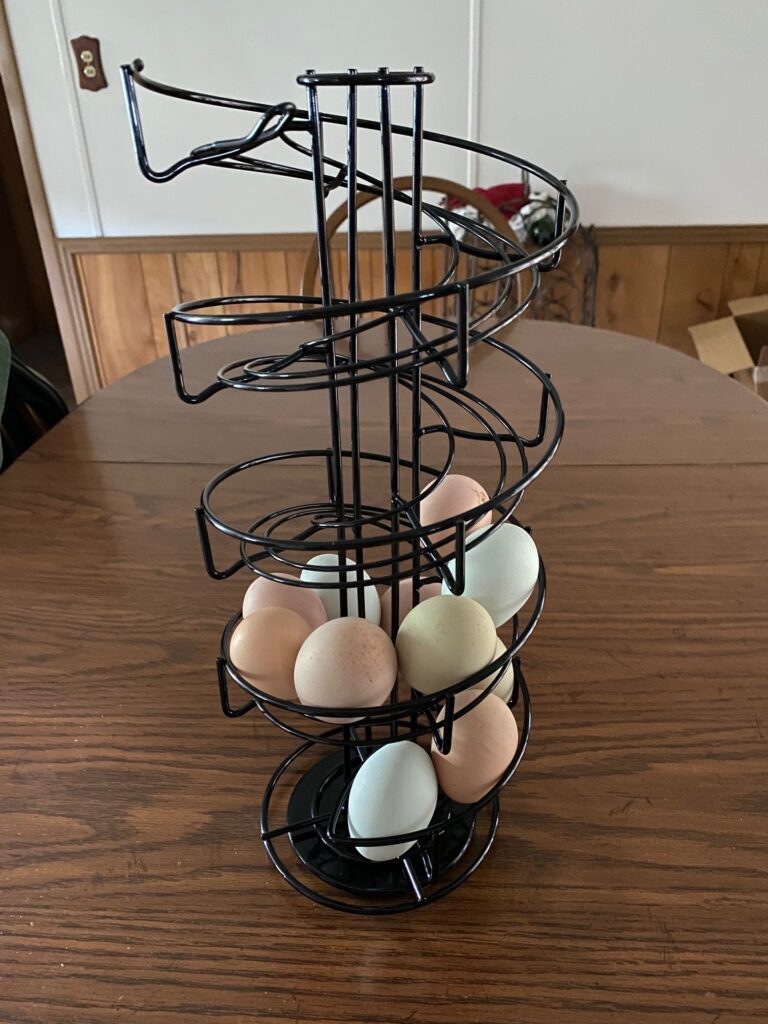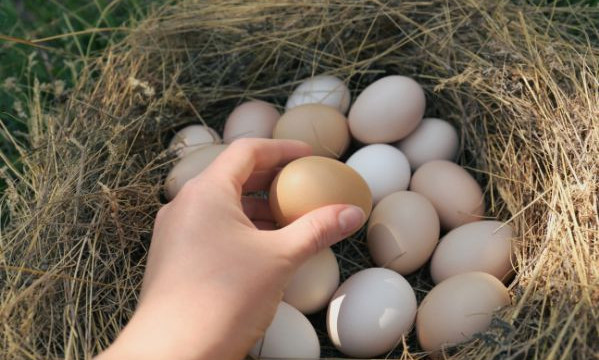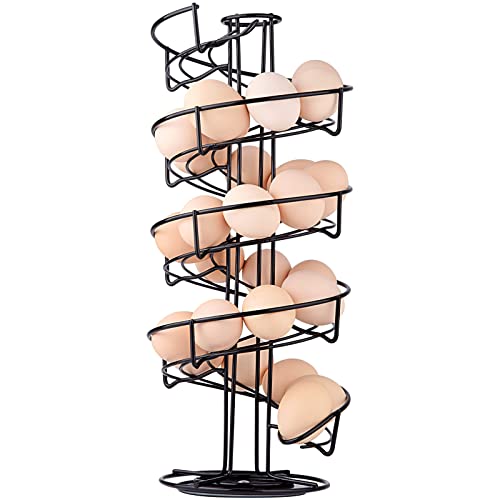
Ah, the joy of collecting fresh chicken eggs every morning! There’s something incredibly rewarding about reaching into those nesting boxes and retrieving the fruits of your labor. But, once you’ve got them, the question arises: how do you store these precious little gems to ensure they remain as fresh as the morning dew? Storing fresh chicken eggs is not a mystery. Read on, and you’ll find out what to do.
Understanding Fresh Chicken Eggs
Before we discuss storage methods, let’s consider what distinguishes our backyard treasures from store-bought varieties.
Store-Bought Eggs
Most commercial eggs are washed, stripping them of their natural protective layer. This process can affect their shelf life and removes a bacteria barrier that is so important to the survival of a potential chick, making refrigeration essential.
Fresh Backyard Eggs
Your backyard eggs come with a natural protective ‘bloom.’ This bloom keeps contaminants out, and it’s one reason fresh chicken eggs can often be stored without refrigeration for weeks.
This might seem odd in this age of over-sanitizing, but nature has provided the perfect storage tool built into fresh eggs. Why not trust it?
Why Proper Storage Matters
Ensuring your eggs are stored correctly is crucial for the following:

- Preventing contamination: Correct storage keeps harmful bacteria at bay.
- Preserving taste and nutritional value: Who doesn’t want delicious, nutrient-rich eggs?
- Increasing shelf life: Properly stored eggs last longer and reduce waste.
To Wash or Not to Wash?
The big debate in the egg world!
I don’t wash my eggs because I like the idea of keeping bacteria out of the eggs naturally. I also like the look of eggs in a bowl or skelter on the counter or table in the kitchen.
The Natural Protective Coating
The ‘bloom’ is nature’s way of keeping the egg safe. Washing might be necessary if they’re noticeably dirty, but be cautious!
Proper Washing Techniques
If you must wash them, use warm water. Cold water can cause the egg to contract and pull in bacteria. Specific egg-cleaning solutions are also available, which can be found here ==>Please Click Here For Egg Washing Info<==.
Ideal Storage Solutions
Let’s take a closer look into where to keep those lovely eggs.
Refrigeration: The Cold Truth
Storing in the fridge is a common method. Ensure they’re placed in the coldest part, ideally in an egg tray. But you don’t want them to freeze, so make sure the coldest part of your refrigerator isn’t freezing.
Freezing is okay, but not in the shell. Read on for freezing tips.
Room Temperature Storage
If you prefer the countertop, leave your eggs unwashed and ensure your space is cool and dry. Generally, they can sit out for about two weeks.
During the first week, you may still have the option to incubate your fresh eggs, provided a rooster was in the flock mix where the eggs originated.
Egg Skelters: More than Just Decor
These nifty tools ensure eggs are used in the order they’re collected. Plus, they’re a cute kitchen addition! Egg skelters feed eggs in an orderly fashion, from oldest to freshest.
This handy counter topper has many benefits. It keeps your eggs organized in chronological order, so when you gather from the coop, simply place the freshest eggs at the top of the spiral and let gravity feed you the oldest eggs first.
The vertical nature of the skelter saves space on the counter.
Tips for Long-Term Storage
For those looking to store eggs for extended periods:
Freezing Eggs
Yes, you can freeze them! Crack the eggs into a bowl, mix well, and then transfer to ice cube trays or freezer containers.
Water Glassing
An old-fashioned method involves “Water glassing,” which refers to a centuries-old preservation method primarily used to extend the shelf life of fresh eggs without refrigeration. The term “water glass” comes from the primary ingredient used in this process: sodium silicate, which is often called “water glass” or “liquid glass.”
Here’s a basic description of how water glassing works:
- Preparation: Begin by selecting clean, fresh eggs that are free of dirt and debris. It’s essential not to wash the eggs as doing so can remove the natural protective bloom that helps keep out bacteria.
- Solution Preparation: Mix the sodium silicate with water. A common ratio is one part sodium silicate to nine parts water. Still, it’s always a good idea to follow the specific recommendations on the sodium silicate product or a trusted guide.
- Storing the Eggs: In a clean, sterilized, and large container (like a crock or a food-grade plastic bucket), slowly pour the solution over the eggs, ensuring they’re fully submerged. Ensure there’s about a two-inch layer of the liquid above the topmost eggs. The eggs shouldn’t touch each other or the sides of the container.
- Storage Location: Store the container in a cool, dark place. It’s crucial to keep it away from drastic temperature fluctuations.
- Usage: When you’re ready to use an egg, simply remove it from the solution, rinse it off, and cook as usual. Always crack the egg into a separate bowl before using to ensure its freshness.
- Duration: Using the water glassing method, eggs can be preserved for several months up to a year, depending on conditions. It’s essential to regularly check the solution to ensure the eggs remain submerged and that the solution remains uncontaminated.
This method was popular before refrigeration became widespread, especially in rural areas. While it’s less common today due to modern refrigeration, water glassing is still practiced by those interested in traditional food preservation methods or those preparing for situations where refrigeration might not be available.
It’s always essential to be cautious when consuming preserved foods. If an egg smells off or looks suspicious, it’s best not to consume it.
Oil Coating
Applying a thin layer of mineral oil can seal the pores of the eggshell, extending its life.
Frequently Asked Questions
How long do fresh chicken eggs last?
Fresh chicken eggs will last from two weeks unwashed on the kitchen counter or a couple of months washed and in the refrigerator. Chicken poop on fresh eggs is a good reason to wash them.
Can you store eggs in their own carton?
Certainly! Cartons help in preventing the absorption of strong odors and flavors.
What if an egg is cracked?
Safety first. It’s best to use cracked eggs immediately or discard them.
How to test for an egg’s freshness?
Try the water test. Fresh eggs will sink, while older eggs will float.
In Conclusion
Proper storage is king in the world of fresh chicken eggs. By understanding the nature of these eggs and employing the right techniques, you can savor their goodness for longer. So, here’s to many delightful breakfasts, lunches, and dinners courtesy of your feathered friends!
Thanks for stopping by, and the best of luck to you 🙂
Dave
Chickenmethod.com


